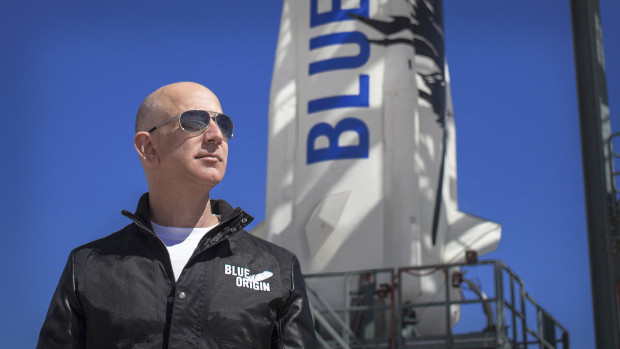
Though these two haven't discussed the possibility of a cage match, Jeff Bezos and Elon Musk have been competitively orbiting each other for years. The leap-frogging they've been engaged in has reached beyond their respective places on the billionaire's index and into their space-faring organizations.
Bezos founded Blue Origin in 2000, back when he was worth only an infinitesimal fraction of his current net worth. Less than two years later, Musk started SpaceX and the war to the stars was on.
DON'T MISS: Jeff Bezos Makes a $120 Million Move Against Elon Musk
Though Blue Origin had its first successful, sub-orbital test launch in 2006, the company hasn't tracked very many flights since. SpaceX launches, on the other hand, have become routine; the company has launched its Falcon rockets a total of 250 times as of last week.
But Blue Origin is closing in on the launch of its highly-anticipated New Glenn project, a heavy-lift launch vehicle designed to carry both people and payloads to and beyond Earth's orbit. The company expects to fire its thrusters on New Glenn next year.
But Bezos' company isn't in any huge rush to catch up to Musk just yet. Where SpaceX has become known for its speed, Blue Origin is taking the slower, more cautious route with the goal of being far less experimental.
More SpaceX:
- Environmental Groups Make Serious Move After Damaging SpaceX Explosion
- Elon Musk Says He Has the Answer About Aliens
- Watch: Elon Musk's SpaceX Sets a Giant New Record
“Even though it’s our initial launch, our position isn’t to hope,” Jarrett Jones, senior vice president for the New Glenn project, told the Wall Street Journal.
SpaceX's April Starship launch ended in a fiery explosion, something that Musk still hailed as a success, saying in June: "In launching, what you’re doing is trying to resolve the unknowns, which you cannot know before you launch.”
Blue Origin's more methodical approach, George Sowers, a former rocket developer at United Launch Alliance said, gives the company something of an edge.
"The advantage is you’re not going to make as many mistakes,” he told WSJ. "But SpaceX would say, ‘Hey, making mistakes is how we learn.’”
Blue Origin won a $3.4 billion NASA contract to fly astronauts to the moon in May; the organization awarded SpaceX a $3 billion contract to do the same thing in 2021.
“I think everybody wants New Glenn to fly at the earliest time possible. Everybody does,” Blue Origin CEO Bob Smith told WSJ. But “we’re not going to sacrifice doing it right.”
Get investment guidance from trusted portfolio managers without the management fees. Sign up for Action Alerts PLUS now.







